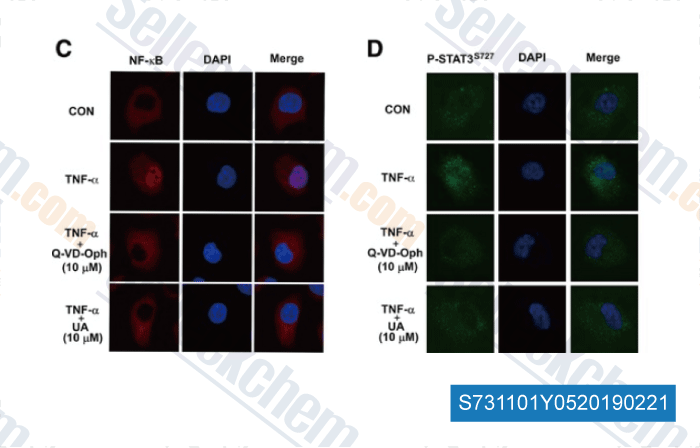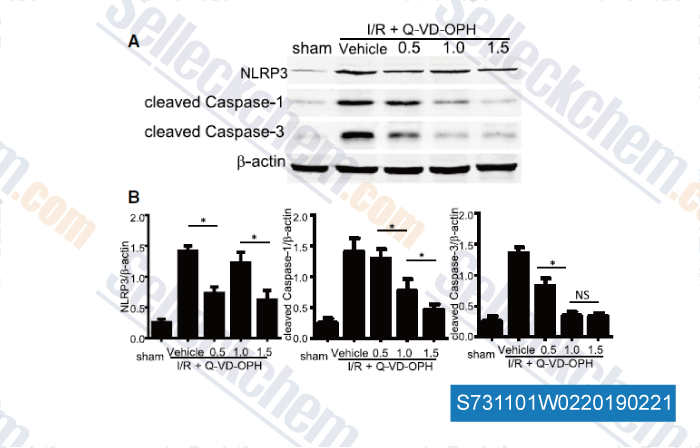|
Toll Free: (877) 796-6397 -- USA and Canada only -- |
Fax: +1-832-582-8590 Orders: +1-832-582-8158 |
Tech Support: +1-832-582-8158 Ext:3 Please provide your Order Number in the email. |
Technical Data
| Formula | C26H25F2N3O6
|
|||
| Molecular Weight | 513.49 | CAS No. | 1135695-98-5 | |
| Solubility (25°C)* | In vitro | DMSO | 100 mg/mL (194.74 mM) | |
| Ethanol | 100 mg/mL (194.74 mM) | |||
| Water | Insoluble | |||
|
* <1 mg/ml means slightly soluble or insoluble. * Please note that Selleck tests the solubility of all compounds in-house, and the actual solubility may differ slightly from published values. This is normal and is due to slight batch-to-batch variations. * Room temperature shipping (Stability testing shows this product can be shipped without any cooling measures.) |
||||
Preparing Stock Solutions
Biological Activity
| Description | Q-VD-Oph (Quinoline-Val-Asp-Difluorophenoxymethylketone) is a potent pan-caspase inhibitor with IC50 ranged from 25 to 400 nM for caspases 1,3,8, and 9. Q-VD-OPh can inhibits HIV infection. | ||||||||
|---|---|---|---|---|---|---|---|---|---|
| Targets |
|
||||||||
| In vitro | Q-VD-OPh (5-100 μM) potently inhibits Actinomycin D-induced DNA laddering and subsequent apoptosis with minimal toxicity in WEHI 231 cells. Q-VD-OPh prevents caspase mediated cleavage of PARP and activation of the major initiator and effector caspases. [2] Q-VD-OPh protects cardiac myocytes from virus-induced apoptosis in vitro. [4] | ||||||||
| In vivo | Q-VD-OPh inhibits caspase-1 activity, IL-18 protein expression, and neutrophil infiltration during ischemic ARF in mice. [3] In vivo, caspase inhibition by Q-VD-OPh provides protection from virus-induced myocardial injury, with a significant reduction in caspase-3 activity. [4] In TgCRND8 mice, Q-VD-OPh inhibits caspase-7 activation and limits the pathological changes associated with tau, including caspase cleavage. [5] |
Protocol (from reference)
| Cell Assay:[2] |
|
|---|---|
| Animal Study:[3] |
|
References
Customer Product Validation

-
Data from [Data independently produced by , , Mol Nutr Food Res, 2017, 61(12)]

-
Data from [Data independently produced by , , Neurochem Res, 2018, 43(6):1200-1209]
Selleck's Q-VD-Oph has been cited by 87 publications
| NK cell depletion in bispecific antibody therapy is associated with lack of HIV control after ART interruption [ Commun Biol, 2025, 8(1):236] | PubMed: 39953264 |
| TBK1 and IKKε prevent premature cell death by limiting the activity of both RIPK1 and NLRP3 death pathways [ Sci Adv, 2025, 11(10):eadq1047] | PubMed: 40053580 |
| Antigenic cancer persister cells survive direct T cell attack [ bioRxiv, 2025, 2025.03.14.643359] | PubMed: 40166148 |
| Mitophagy curtails cytosolic mtDNA-dependent activation of cGAS/STING inflammation during aging [ Nat Commun, 2024, 15(1):830] | PubMed: 38280852 |
| Neuronal autosis is Na+/K+-ATPase alpha 3-dependent and involved in hypoxic-ischemic neuronal death [ Cell Death Dis, 2024, 15(5):363] | PubMed: 38796484 |
| Targeting mitochondrial metabolism by the mitotoxin bromoxib in leukemia and lymphoma cells [ Cell Commun Signal, 2024, 22(1):541] | PubMed: 39533399 |
| Novel meriolin derivatives activate the mitochondrial apoptosis pathway in the presence of antiapoptotic Bcl-2 [ Cell Death Discov, 2024, 10(1):125] | PubMed: 38461295 |
| Cancer Drug Resistance: Targeting Proliferation or Programmed Cell Death [ Cells, 2024, 13(5)388] | PubMed: 38474352 |
| Deregulation of lactate permeability using a small-molecule transporter (Lactrans-1) disturbs intracellular pH and triggers cancer cell death [ Biochem Pharmacol, 2024, 229:116469] | PubMed: 39117009 |
| The clarithromycin-binding proteins NIPSNAP1 and 2 regulate cytokine production through mitochondrial quality control [ Sci Rep, 2024, 14(1):2354] | PubMed: 38287119 |
RETURN POLICY
Selleck Chemical’s Unconditional Return Policy ensures a smooth online shopping experience for our customers. If you are in any way unsatisfied with your purchase, you may return any item(s) within 7 days of receiving it. In the event of product quality issues, either protocol related or product related problems, you may return any item(s) within 365 days from the original purchase date. Please follow the instructions below when returning products.
SHIPPING AND STORAGE
Selleck products are transported at room temperature. If you receive the product at room temperature, please rest assured, the Selleck Quality Inspection Department has conducted experiments to verify that the normal temperature placement of one month will not affect the biological activity of powder products. After collecting, please store the product according to the requirements described in the datasheet. Most Selleck products are stable under the recommended conditions.
NOT FOR HUMAN, VETERINARY DIAGNOSTIC OR THERAPEUTIC USE.
